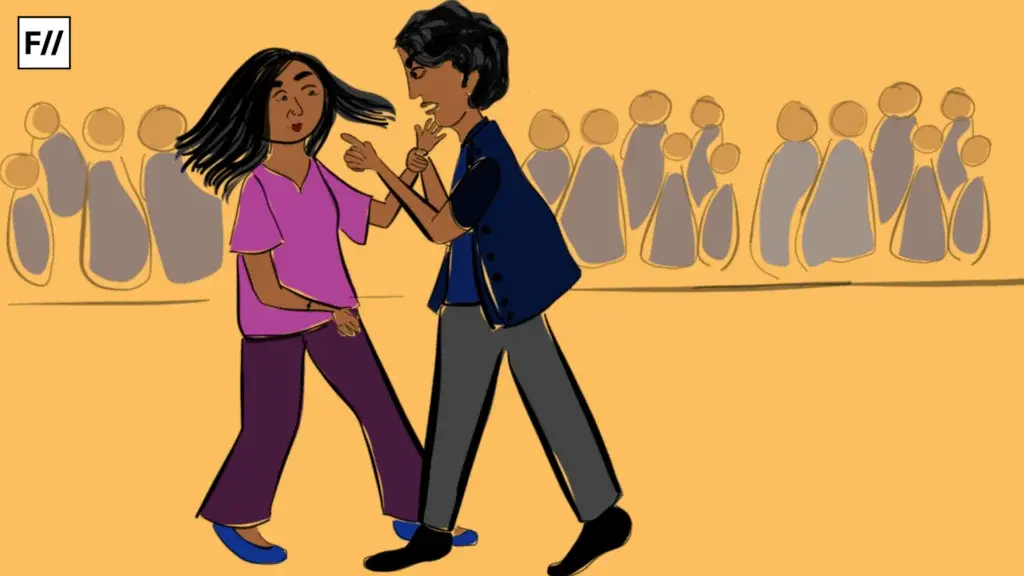Who can ever imagine a childhood filled with unmitigated fear, violence, abuse, tears, and hopeless pain, the source of which is their one true hero—daddy? The father who is revered among his colleagues, but loathed among loved ones for he is an addict – a slave, an irresponsible adult who has turned a blind eye to the suffering he has inflicted upon his wife, and his children. He has two beautiful kids, a daughter, who was once known for her fiery temper and a younger son, who refuses to participate in any kind of verbal communication with him. He has had a ‘rich’ life, yet he could not fulfill his expectations of a good life. To top it all, his sense of self-worth, any modicum of self-esteem has diminished to such an extent that sometimes he cannot look at his reflection without searing bitterness. In the beginning, alcohol came as a respite.
He particularly enjoyed the false sense of guiltless liberation that came with it. After a hard day of work, he didn’t mind having a peg of whiskey. Or two. On special occasions, maybe four. But he didn’t need a large amount to change his behaviour; the wife and the children would watch him turn from a docile, controlled man into a dominating, sadistic beast. After dinner and drinks, he would move to the living area, casually initiating conversation with the wife, his tongue and nerves loosening up as an effect of alcohol.
But he didn’t need a large amount to change his behaviour; the wife and the children would watch him turn from a docile, controlled man into a dominating, sadistic beast.
It would confound the wife, a simple woman as she was, to watch her husband talk excessively, making her wonder if she really knew him. But playing the role of a loving partner, she would oblige and talk to her inebriated husband. He would look at her funny, then steer the conversation in several directions, up until the point he found some particular thing that would trigger his anger and hatred for the self, only to direct it towards his wife, making the two kids watch. He would blame her, rebuke her, mock her, dehumanize her, and on stressful days, beat the life out of her. He would then sink into oblivion, feeling fresh in the morning and ready to face the world.
Also read: Is Our Approach To Alcoholism In Women Sexist?
What started out as a recreational habit soon became a source of anguish for the three helpless inmates of the house. The daughter would watch her mother, her best friend, live in absolute terror when father was around. Every day, as dinner time approached, the two kids would start wandering about the living area, in the hope of helping mother if need be, but really to keep a close watch on every little movement, for the air would be filled with tense apprehension. And out of nowhere, the mighty father would rise and smack the mother, making her fall to the ground and weep with scorn and sorrow.
Days, months, years passed. The habit took a toll on the father, but the real price was paid by the family. The kids grew up terrified, ashamed and depressed. Yet there was love and peace when he wasn’t home. Many relatives reprimanded him for this behaviour, aggravating his guilt and sadness. But the power of habit surpassed all moral boundaries, and he would return to his accomplice, the bottle, night after night. The once spirited daughter was now calm, secretly fuming with anger, replaying years and years of abusive episodes in her mind, dreaming of finding an escape plan for mother one day.
He would blame her, rebuke her, mock her, dehumanize her, and on stressful days, beat the life out of her. He would then sink into oblivion, feeling fresh in the morning and ready to face the world.
She dreamt of studying hard, buying a house for her, and if the situation called for it, ask her to file for divorce. These were the thoughts that occupied her mental space for years. At work, she had to take several emergency leaves just to fly back home, to check on her mother when things got dire. On of these trips, she threatened and hit her father, for she could not take it anymore. She hit him, once, then again. That was the day he quit.
What she was left with though was isolation, shame, deep-seated trust issues, and incessant guilt. An utter fear of conflict, confrontation and authority plague her. She sought unabashed approval, developed a low sense of self-worth, became excessively responsible and avoided any kind of conflict. The idea of ‘normal’ always eluded her, for she grew up in an abnormal household with an abusive father. She lost her ability to express emotions, for there was no time to really ‘feel’ while growing up, in addition to the fact that every little thing that she felt as a child, she stuffed inside. It hurt too much.
Also read: The Anti-Arrack Movement: The Historical Women’s Protest For Total Alcohol Prohibition
And today, she feels different, alienated, lonely, yet afraid to be alone. She has a hard time identifying herself as an individual, for in her mind’s eye, she is still the daughter of an alcoholic and that is identity enough for a lifetime.
Featured Image Source: The Atlantic
About the author(s)
Priyanka is an unfulfilled engineer and an MBA graduate from IIM Indore. She is a writer, interested in carving the world through her biased lens, painting pictures with heavy imagery and highlighting the mundane, often ignored, but essential aspects of life. Her latest project is The Mental Indian, an attempt to de-stigmatize mental health in India, through stories, perspectives and conversations.




